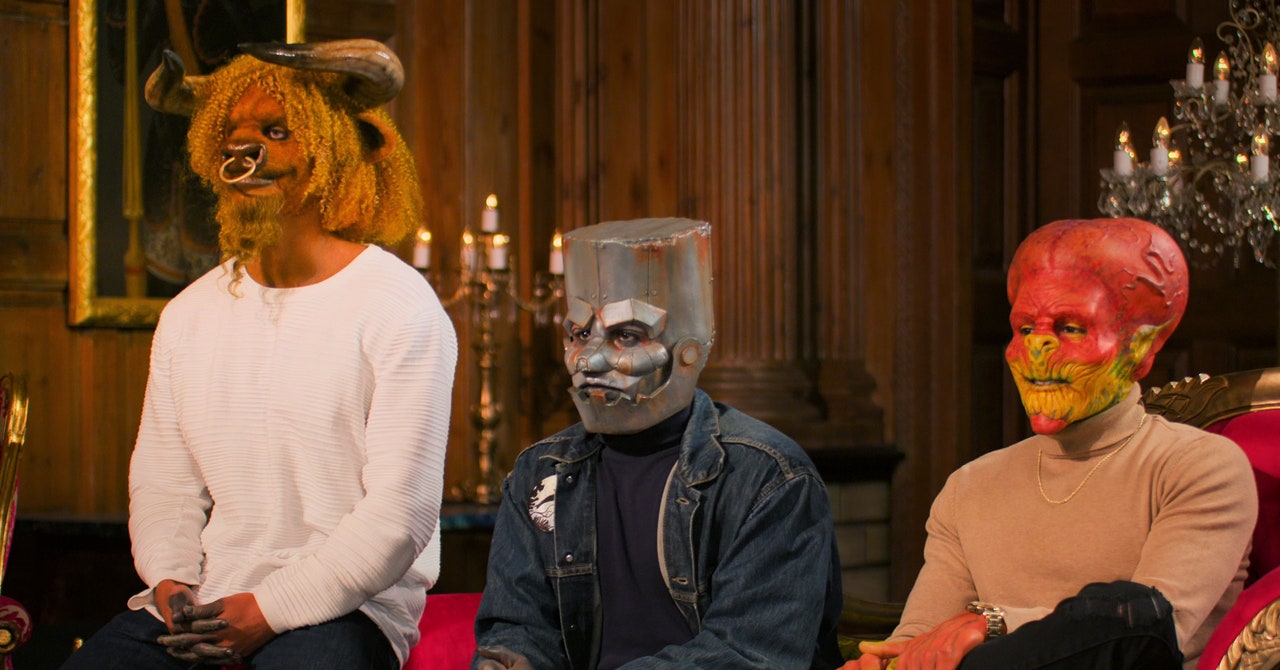
Why do people watch dating shows? Forget high-minded rationalizations about contemporary sociology and mating rituals—the real reason isn’t deep. To be blunt, it’s just plain fun to ogle good-looking people as they preen for one another. Always has been, always will be. The new Netflix reality series Sexy Beasts, a reincarnation of a British program of the same name, understands this basic truth and engineers its episodes around it, all while pretending to reject it. Instead of judging each other’s looks right off the bat, the contestants don elaborate makeup and prosthetics to hide their faces, saving the hot-or-not reveal until the end of each episode. It’s a canny premise. Alas, Sexy Beasts is more interesting to think about than to watch.
In each installation of Sexy Beasts, which premieres today, three suitors vie for the affection of one person, with everyone transformed into a creature to obscure their appearance. A friendly panda gets courted by a tin man, an alien, and a bull; a wolf must choose between an owl, a troll, or a dinosaur; and so on and so forth. After a first round of dates, there’s a first round of rejection, with a loser sent home. After the second round, the process repeats. After each rejection, viewers and participants get to see what the person sent home looks like. Then, at the end, the winning suitor meets their match face-to-face. The result is a show purporting to be about taking looks out of the equation that is, in actuality, a show about giddily anticipating whether someone you’ve hit it off with in conversation is as smokin’ as you’d hoped. (The contestants tend to favor body-conscious clothing, with tight dresses or biceps-outlining shirts meant to signal attractiveness. It feels like cheating, but oh well.) The show doesn’t redirect contestants’ focus away from looks so much as make them more fixated on unearthing hotties.
When the Sexy Beasts trailer came out, its bonkers makeup artistry and high-concept gimmick were enough to generate a thousand furry-joke headlines and scores of Twitter reactions. It looked like a sure bet for Netflix. The Masked Singer, a vocal performance competition show, has a similar conceit, with contestants hiding themselves behind entertainingly elaborate disguises, and it has proved a monster hit for Fox. I have my doubts about Sexy Beasts’ staying power, though. The final product is just too boring. Host Rob Delaney, a talented comedian, is so toned-down as narrator, you could’ve told me an AI was doing the voice-over and I would have believed you. The makeup is genuinely impressive—if only they’d included some sort of behind-the-scenes bonus episodes about the process of taking it on and off!—but the dates are bland, with fill-in-the-blanks banter. Casting went light on villains and oddballs, leaving a likable but dull roster of affable people who politely prod one another’s chin prosthetics while giggling.
To the last person, everyone on the show is exactly as generically good-looking as an actor in a dish soap commercial, which is understandable (picking obviously bad-looking people to participate would’ve been cruel). But it means that it’s a show where the reveal is always “Oh, turns out they were hot, damn.” That gets old quick! In contrast, the masked singers on The Masked Singer are always C- to Z-list celebrities, which makes it a considerably more gripping and varied guessing game.
If anything, Sexy Beasts is the rare show that feels like it would’ve worked better as a Quibi offering. If each episode was, say, five minutes long, it’d be a stronger product, as the premise and the end reveal are the only compelling parts. But while it doesn’t get high marks for entertainment value, it is notable for how forthright it is as a dating show. Despite grabbing attention for its outlandish costumes, it features courtship behavior that is far more down-to-earth than its dating competition predecessors. One contestant admits she’s only there to break a dry streak, and she is visibly relieved when she’s eliminated. An American participant notes that choosing a suitor from England makes a real relationship between them unlikely, but she had fun anyways.
I’ve always found shows like The Bachelor and its spin-offs to be excruciating watches; the agreed-upon narrative that contestants are genuinely looking to find long-term commitment under such contrived circumstances is, for me, simultaneously unbearably cynical and unbearably ridiculous. With a few exceptions, the contestants on Sexy Beasts openly embrace the ridiculousness and cynicism of its premise. They appear to be looking for a fun time, to enjoy their own 22 minutes of fleeting Netflix fame. There are a few contestants, like the party-girl panda, who pay lip service to wanting to make a real romantic connection on the show, but most participants seem to view their appearances as a commitment somewhere between swiping right on Tinder and going on a third date. This is refreshing, and it lowers the moral ick factor—but it also lowers the stakes considerably. Instead of a dramatic, tear-filled rose ceremony, the beasts of Sexy Beasts are dismissed quite casually and walk away without hard feelings. There’s no artificial heartbreak. But once the novelty of seeing people dressed up like mythical creatures and zoo animals wears off, there’s a decided lack of spectacle to watching two pleasant-looking and agreeable people agree that they are both pleasant-looking and agreeable. If the showrunners of Sexy Beasts were as breezily honest as its contestants, it would have had a different title. But, of course, Moderately Attractive but Strangely Boring Beasts doesn’t have much of a ring to it.
More Great WIRED Stories
